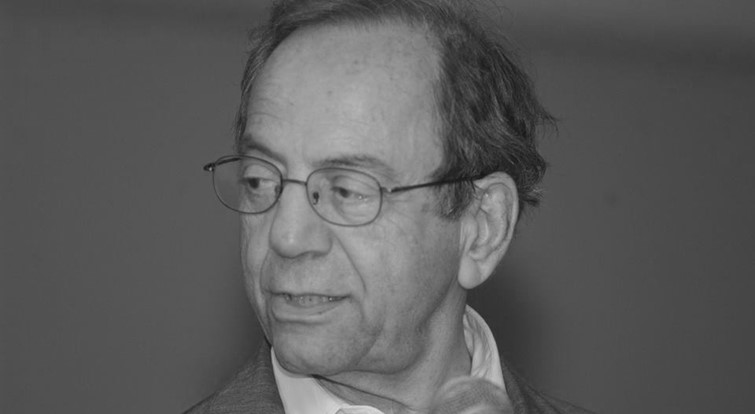Douglas Mitchell on Donald Levine
When sociologist Donald Levine (1931–2015) passed away this April, the Chicago Tribune asked University of Chicago Press executive editor Douglas Mitchell to offer up some remarks on his decades long personal and professional relationship with the longtime University of Chicago professor and former dean of the College. With Mitchell’s permission, they follow, in full, after the jump.
***
Don Levine and I go back a ways. In fact, the Chicago Tribune plays a role in my memories because of a “First Person” feature the Trib did about me on June 22, 1986 (you probably remember these full-page bio-vignettes in the Sunday magazine, usually on or near the back page—inspired no doubt by Studs Terkel’s Working, the reporters would sniff out interesting occupations, usually stuff like pizza delivery guy, parking lot attendant, hotel housekeeper, and the like, but then they got the idea of doing a white-collar type). I told the story of how I had been leafing through old files and found a one-paragraph sketch of a book on precision vs. ambiguity in language, and how the worship of precision actually disrupts understanding and relationships. It turned out to be Donald Levine’s book idea. I was smitten. I called him (we had no contact prior to that even though he was on the faculty; this was back when I was new to the Press in the late ’70s). Conversations with him led me to see that ambiguity has very definite positive functions in poetic and diplomatic and heuristic contexts, and so, chapter by chapter, we worked together for a few years to bring to fruition his The Flight from Ambiguity (1985).
Conversations with him were exciting because he had such a restless mind, curious about everything (a lot of curiosity for intellectuals comes from a wish to convert what they find back into their own terms, their own frameworks, but it’s a constant process of modifying ideas, both for the thinker and the interlocutors). In fact, I sometimes wondered how he managed to settle down his constantly searching gaze enough to get, not just words on paper, but whole arguments and whole books that had coherence; he did have a respect for aphorism, and had an aphoristic turn to his thought. The interest in language came from two sources: his intensive fieldwork in Ethiopia (where discourse had a culturally embedded double track, one that prized ambiguity for its hidden, allegorical meaning: gold, and one for obvious, literal meaning: wax); the other source was the philosopher Richard McKeon, in whom both Don and I took a lifelong dedicated interest, in part because McKeon had found ways to map univocal and polyvocal structures for generating new ideas and arguments and for judging evidence and results. It was McKeon’s vast interdisciplinary work in systematic pluralism that appealed to Don’s interest in multiple possibilities and in liberal arts of discourse.
His work as dean of the College at the University of Chicago was influenced in turn by this vision of plural methods and arts (including martial arts, as you doubtlessly know), and out of that experience with curriculum planning and experimentation came one of his most widely read books, Powers of the Mind: The Reinvention of Leaning in America (2006). At a time when higher education has gotten commodified and corporatized, Don’s book seeks relevance in new formulations and applications of traditional disciplines, and is far more powerful as an antidote to mere utility and a celebration of learning for its own sake than, say, Fareed Zakaria’s new book on education.
Don’s keen interest in philosophy (much of it by way of his auditing of McKeon’s classes and reading McKeon’s work) is at the foundation of his great commitment to the work of Georg Simmel. Don edited a collection of SImmel’s key writings for the Press’s Heritage of Sociology series, and it remains as one of the bestselling volumes in that series (up there with Weber, Marx, and Durkheim). He had a lot to do with making North American sociology safe for Simmel; one of his last books was a translation and edition of Simmel’s essays in metaphysics (The View of Life, 2011), precursors in a very special way to Heidegger’s philosophy. And, not least, this reverence for heritage of ideas and cultural traditions made Don a first-class historian of sociology as a discipline. Another very influential book, thus, was Visions of the Sociological Tradition (1995).
Don’s own powers of the mind were marked by their protean vivacity, as you can tell; and so were his powers of the body (others can speak to his expertise in martial arts, and his workshops for students in aikido, an art of which he was a master). The conjunction of the two, mind and body, came in his powers of the soul: he and I bonded strongly over our mutual love of music, and here again his curiosity led him to go beyond the classical music in which he was an adept (as a violist; he also composed) to jazz, which is my idiom. He would stop by on many occasions to the South Side bar where my jazz band plays on Sunday nights, listening intently, asking for the names of tunes and seeking instruction in motifs, rhythmic riffs, and other aspects of the music. When I had a birthday that happened to fall on a Sunday, year before last, Don somehow found out about it and showed up with balloons, flowers, a card, and his irrepressible self. Ebullience came to him as naturally as Charlie Parker tunes come to jazz musicians.
—Douglas Mitchell
